
Now that the recap is out of the way, I just wanted to thank everyone for being patient regarding the latest bandwidth shenanigans at the Fishbiscuitland forum. For putting up with the nosebleeds from all the board flashes everyone was experiencing over the past few days.
It turns out that we've been busier than expected, and had more traffic than I'd anticipated. I turned the FDW upgraded the account asap, but it took a while for the new settings to kick in.
Everything is looking sweet now, and the limit is so high that I don't think bandwidth should be an issue again. Not even if someone puts lifesized pics of Josh and Evi in their sigs. Though, let's not tempt fate, mkay? It's a fickle frakking bitch.
Thanks for hanging in there.
Read more...
Sunday, March 29, 2009
Forum Update
Saturday, March 28, 2009
BURNING DOWN THE HOUSE
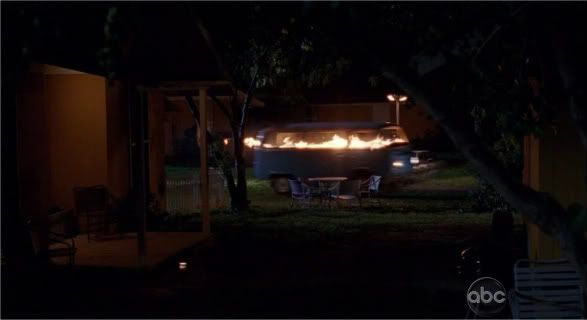
We're all familiar with the grandfather of all unanswerable questions: Which came first, the chicken or the egg? This episode asked a different question: Which came first, the chicken
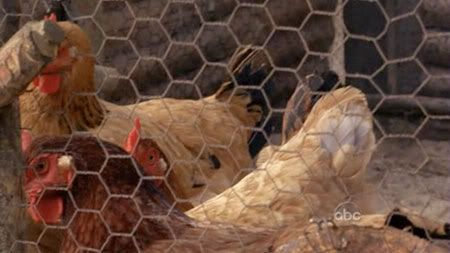
or the chicken sandwich?
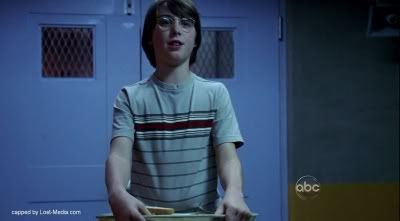
Little Sayid Jarrah suavely killed his first victim
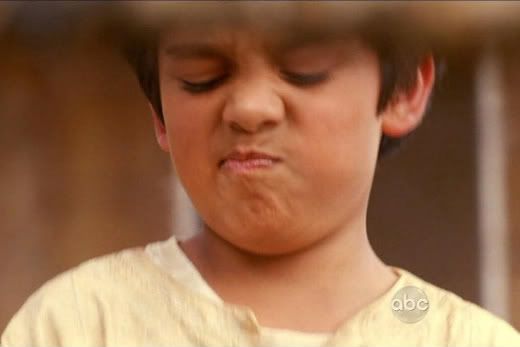
about thirty years before little Ben Linus offered it back up to him, all diced and seasoned and neatly cut into triangles. So which came first? Did Sayid break Ben's heart before or after Ben stole Sayid's soul?
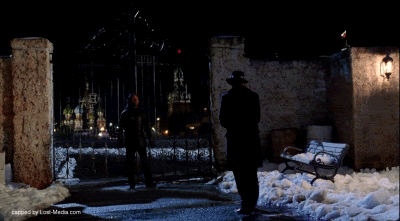
The collateral damage of Sayid and Ben's odd coupledom ran the gamut from Avellino

to Andropov,
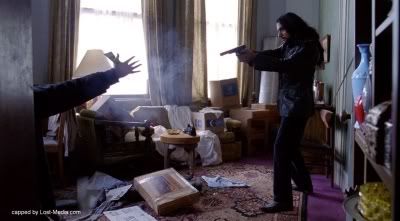
with god knows how many others in between. Together they were a very efficient Murder, Inc.
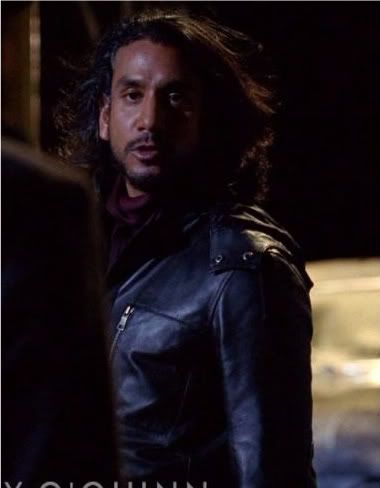
Ben made Sayid think he wanted to kill the people that Ben wanted killed and then he recruited Sayid to return to the Future Past where Sayid's revenge could damage Ben in such a way that he'd grow up to be the kind of man who would make Sayid want to kill the people that Ben needed killed.
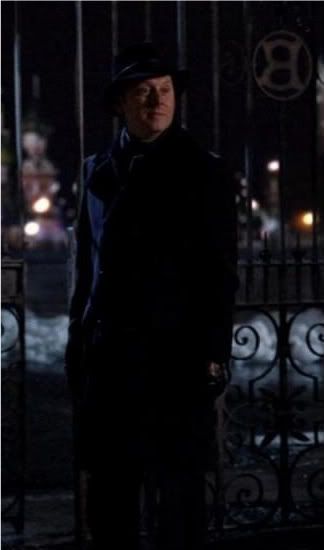
It's a match made in Heaven. Or in Hell.
In the opening scene, we learned that Sayid had the skill of the kill from an early age. Not that he got any thrill from killing. He did it to save his big, soft brother from their Bad Iraqi Dad. Even at eight, Sayid killed with a gentle soul. It was a job. And let's freaking face it, if you grow up on a farm, and you eat chickens for dinner, then chicken killing is not exactly optional. It doesn't mean Sayid was a born psychopath because he was a farmboy who choked chickens. It meant he was a useful member of his society.
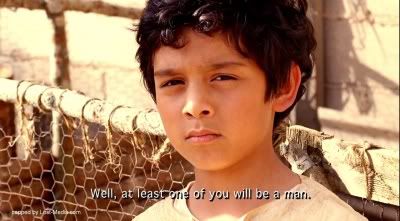
Sayid's Bad Dad insisted on murder as a rite of manhood. Ben's Bad Drunk Dad, on the other hand, demonstrated exactly why his son's rite of manhood was all about murdering him.
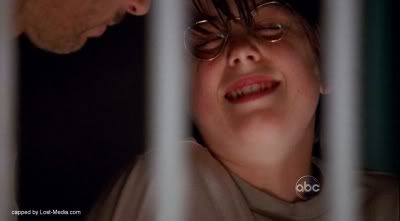
We saw that even in mindless utopias like Dharmalala, fathers were free to brutalize their kids. After all the years of being stranded in Authoritarian Hell, Ben was ready to bust loose. The Purple Iraqi who fell from the sky was Ben's ticket out. Young Ben started finding uses for Sayid the very first day he met him.
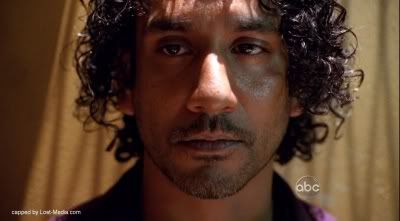
On this turn around the time loop, however, Sayid was immediately hip to Ben's true nature. On the great karmic dharma wheel of birth and death, Sayid was having a moment of clarity. An epiphany. He recognized right away that this battered child was the same partner he'd been dancing across the globe with the past three years.
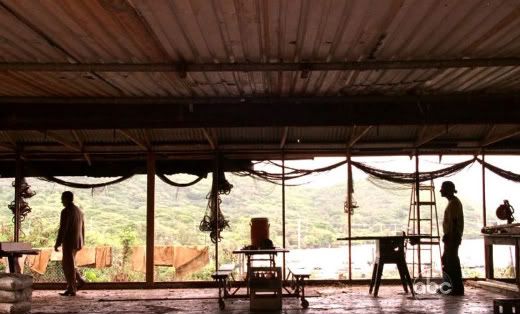
Sayid saw his chance to stick out his foot and bring that dharma wheel grinding to a screeching halt. He found himself face to face with one of time travel's most classic dilemmas: If you could travel back in time and kill Hitler as a child, would you do it? Should you do it?
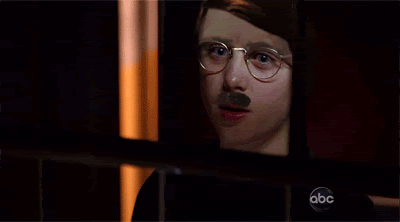
"Kill the nits and there will be no lice!" - Oliver Cromwell
On the one hand, if killing little Adolf could have saved the lives of millions, then it seems like a no brainer. Of course you should kill him. It would be immoral not to! On the other hand, you would be killing an innocent person who would never be able to grow up and commit the crimes for which you just punished him with death. Paradox, clean up in Episode Ten!
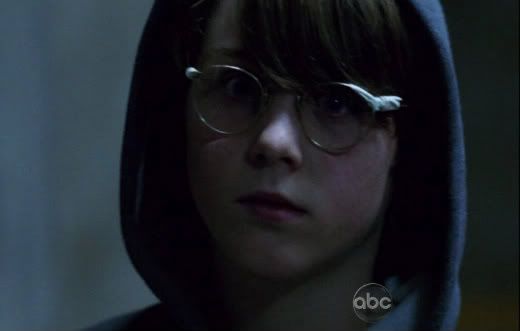
Normally it's inconceivable to think of murdering a child. But Ben was not an ordinary child. He was reading way above his grade level, for one thing. We see that Ben's addiction to long, impossible books began at an early age.
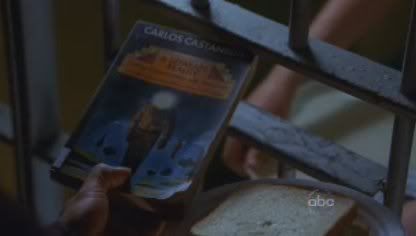
At age 12, he had already digested Carlos Casteneda's "A Separate Reality" - just a little light reading about hallucinogenic enlightenment among the Yaqui Indians. Or maybe little Ben hadn't actually read the book. Maybe he just found it lying around the Dharma community center reading room. The Dharmites seemed to be fans of the mind tripping drugs.
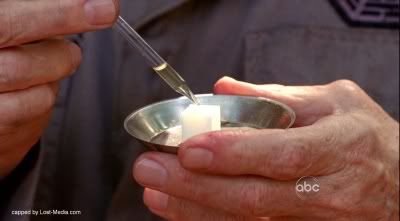
They even had a shaman who lived a holy life among his prayer flags, cooking up batches of acid in his teepee.

They had elevated their biggest stoner to druid status.
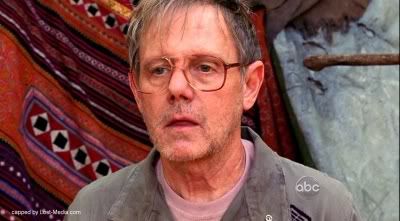
This is probably as good a good place as any to step out and ask a question about this Dharma subplot. I'm sorry to say this, but it reeks of The Dull. Who takes a magnificent Hawaiian backdrop and writes a story set in dark interiors, in Sears Roebucks living rooms and surveillance monitoring stations? And while we're at it, what genius came up with the idea for those jumpsuits? An entire season of island fashion inspired by kibbutzniks.

Seriously, what were they thinking?
I get that there's some secret mission that the Dharma is working on, something that all the lowly proles don't ever get to know about. I get that this whole bodysnatched clan is remote controlled from the DeGroot's University of Michigan stomping grounds in Ann Arbor, as Radzinsky obnoxiously reminded them.
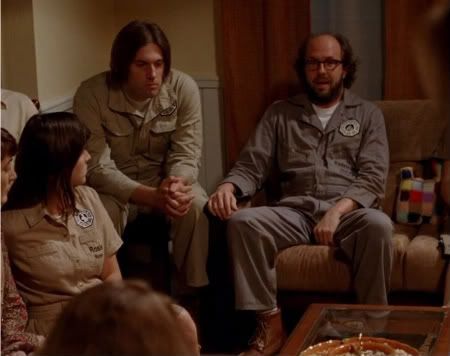
But god, they are boring! Their little Stepford Town is filled with people who came to a paradise island so they could sit in the dark spying on each other.
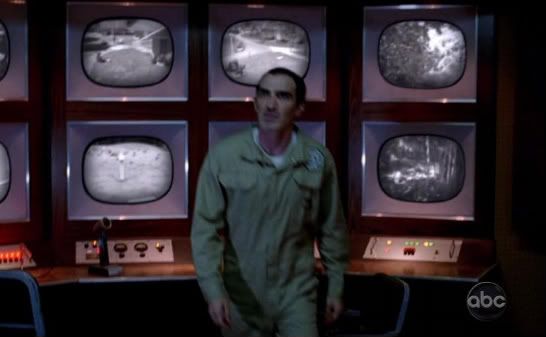
And the only alternative to this kind of tv show
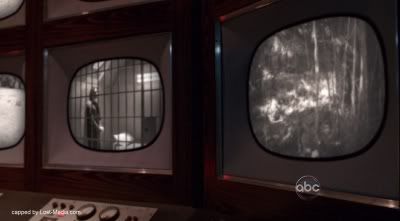
is this kind:
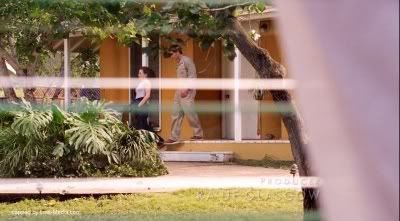
They have elevated tiny hands Horace to be their exalted Grand Poobah.
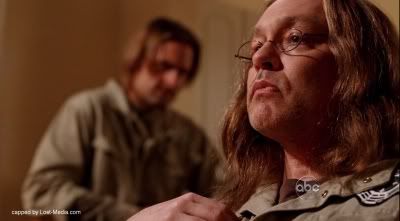
They think with one mind.
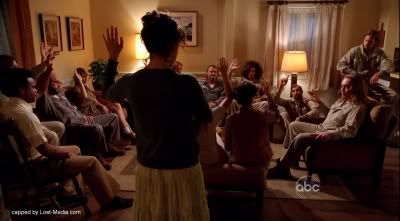
Like the friendly neighbors in Shirley Jackson's The Lottery, the Dharma-bots calmly agreed to send an innocent man to his death. Even though they thought Sayid was insane, they were very eager to kill him dead. Even sweet little Mother of Ethan joined in the demonic groupthink.
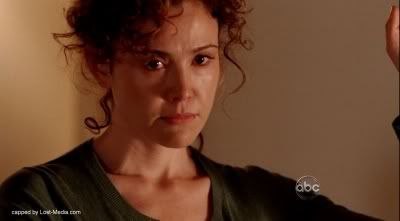
It didn't matter that he had done them no harm. They were keeping a clean campsite by killing the crazy man before he had a chance to become a spy. They were just being friendly neighbors and citizens. I mean, it's not like they had any free choice in the matter.
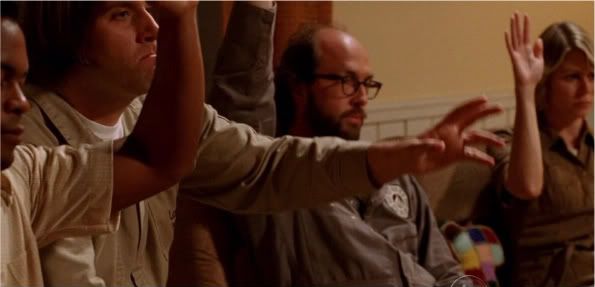
"Thoughtcrime does not entail death. Thoughtcrime IS death." - George Orwell, 1984
The dark dystopic underbelly of Dharmalala is starting to lurch into view. In some ways, the world inside the sonic fence reminded me of the people who lived inside M. Night Shyamalan's The Village, in an uneasy Truce with the Monster that lurked outside the ring of yellow trees.
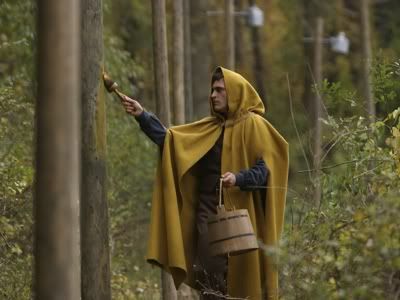
Sawyer knows that there is something rotten in Dharma. Still, he likes the prestige he has in this insular community of paranoids. He's been enjoying being among them but not of them, but after all this time, the lines have started to blur for our boy. He speaks of "my people" a little too territorially. Who are his "people" these days? Does he know?
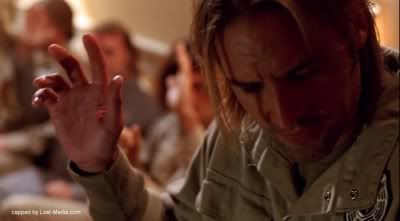
Sawyer has been going to the Dharma potluck dinners and the penny socials and the cookouts for three long blissfully stupid years. Is he one of them now? Is he loyal to Them or to Us? And which is which exactly?
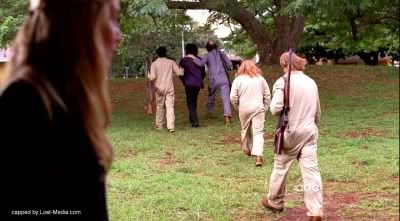
"All men are enemies. All animals are comrades."- George Orwell, Animal Farm
It seems to be the nature of human beings to separate the world into Us and Them.The Dharma are Us. The Hostiles are Them. As Ben once explained, "The DHARMA Initiative. They came here seeking harmony, but they couldn't even coexist with the Island's original inhabitants." But why? What makes the Hostiles so different? What makes them so dangerous to Dharma?
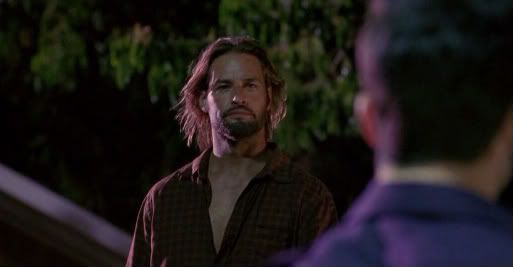
Sawyer's initial encounter with the Hostile leader Richard was a smashing success, and Richard at least knows that Jim LaFleur is not what he presents himself as. Yet Sawyer has since chosen to enable the Dharma in their bitter standoff with the indigenous people they exiled within their own homeland. Sawyer has made some serious moral compromises in the past three years. He's not going to be able to just think himself free of all the consequences. Fresh off last weeks SmackJack high, Sawyer this week had to deal with the hubris hangover. He had thunk and thunk until he had a perfect plan to ensure Sayid's safety, but the only thing he didn't think about was what if Sayid didn't want to be saved?
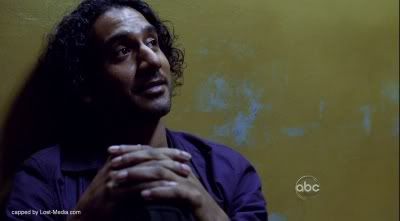
He was faced with a version of the classic Trolley Problem. Let's customize it to make it into a Flaming Runaway VW Bus Problem.
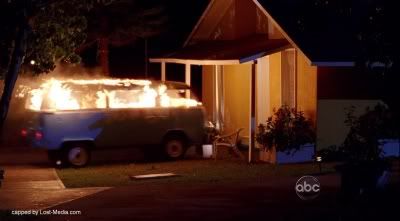
If a flaming runaway VW bus were headed towards a house with five people sleeping in it, and you could somehow divert the bus to crash into a house with only ONE sleeping person in it, would you do it?
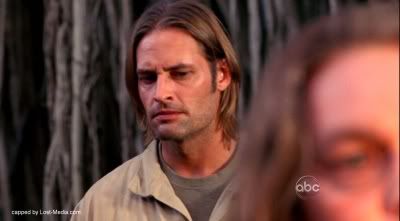
The hypothetical can be made more difficult. What if the five people you might save were all strangers, but the one person you might kill was your beloved old friend?
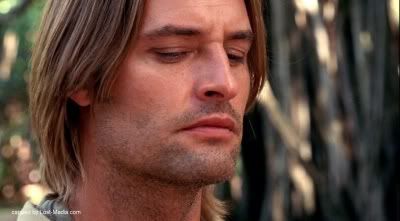
To make it even harder, what if you had to personally drive the bus yourself into the house and see the person inside it die?
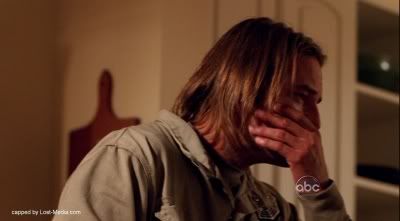
This is the kind of problem Sawyer was faced with in this episode. To save one and endanger many, or to let one die while protecting some who weren't worthy of his loyalty. Ultimately, he came through for Sayid, as we knew he would, but I hope he's got some books on classical ethics to read. I don't think this is the last time he's going to be faced with this kind of dilemma.
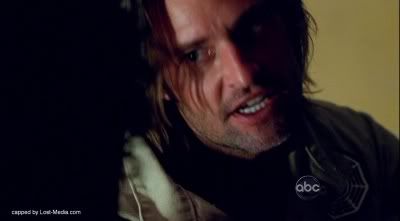
Rip Van Sawyer is slowly waking up from his long nap among the lotus eaters. His gallant speech to Juliet about nothing changing didn't even sound like he was fooling himself. If nothing else, Juliet is a smart chick. She can't be sleeping well knowing that Kate and Sawyer are back in one another's magnetic orbit. Doesn't look like Kate is dealing with it all that well either.
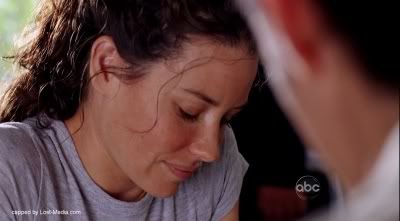
Like Jack and Kate before them, Sawyer and Juliet are being shaken out of their complacency by the big bad wolf of time travel. Sayid may have looked like the villain in this piece, but I think instead Sayid was only trying to be the Brave Little Trimtab. Unaccepting of time's merciless rigidity, Sayid is the one who is forcing the big ship to turn, and all of them will be dragged along the course Sayid has chosen.
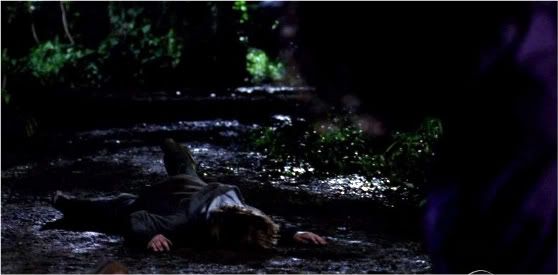
The episode, as is typical of this season, was filled with other parallels and echos. Desmond's drink of choice, MacCutcheon whiskey,
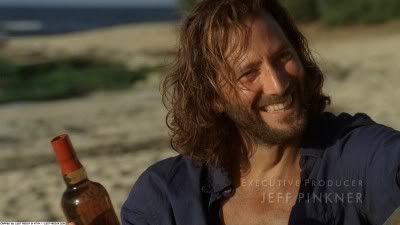
turns up in Sayid's hands, right before he is snookered into handcuffs by another beautiful woman.
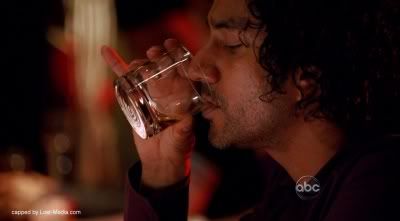
Ben's dark hood echoed another troubled boy's favorite outfit.
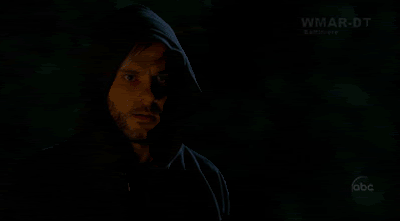
Reflections showed up in the weekly word game. The words over this Moscow doorway, when reflected in a mirror and translated from the Cyrillic alphabet, read as Oldham Pharmaceuticals.
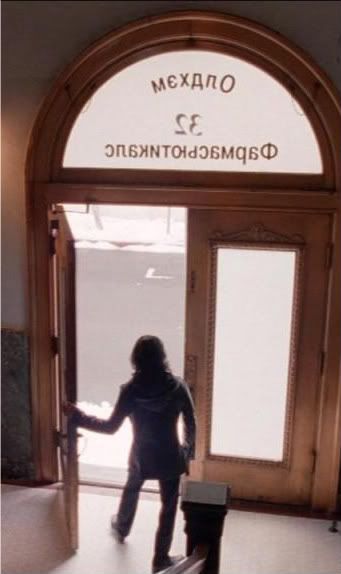
A clevah! shoutout to this episode's very own Oldham the Pharmaceutist.
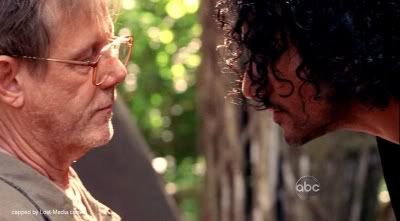
Like Eko,

Sayid killed out of love and loyalty to a brother.
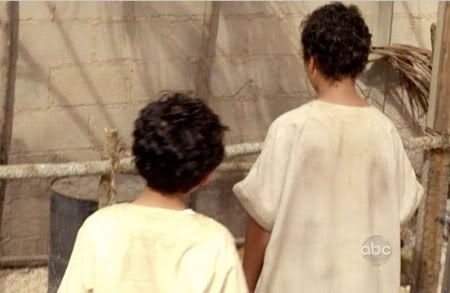
Ben followed in the future footsteps of another gifted child, Walt, by setting a fire as a distraction to control the clueless grownups.
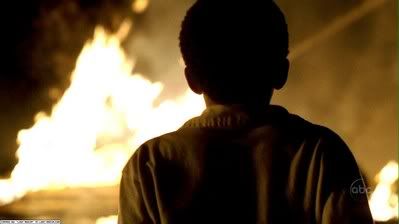
Of course the most dramatic parallel was this one, a revisitation of Torture Among the Banyans.
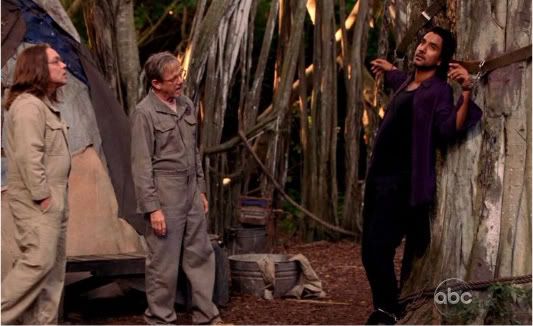
This scene was an obvious throwback to one of Lost's all time great scenes.
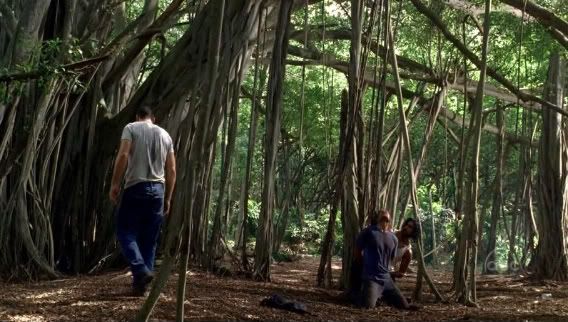
But this torture scene, sadly, paled in comparison. It's not just that it lacked the obvious hotness factor.
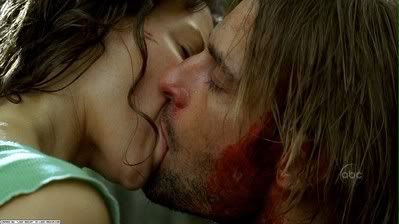
It also lacked...uh, torture. Horace's bit of intimidation with the rose cutters was kind of scary at first,
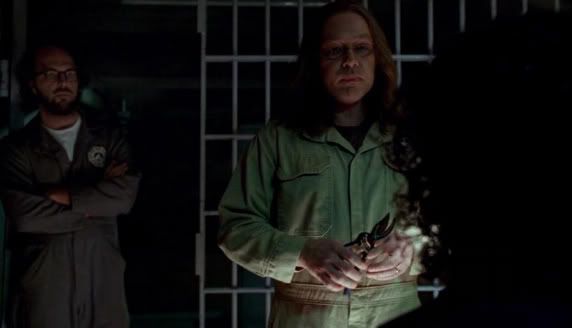
but looked immeasurably lame when compared to Sayid's weapons of intimate destruction.
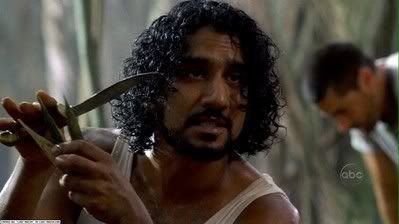
And where Sayid's methods were designed to inflict maximum agony,
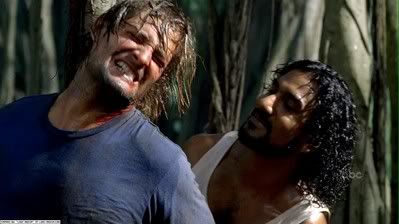
Dharma torture looked like it was kind of fun.
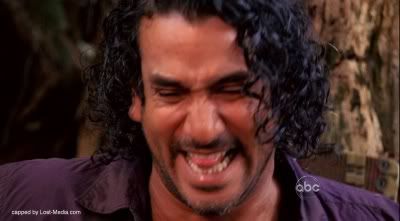
Having watched them torture Sayid with sugar cube LSD, you have to wonder how they planned to kill him. Tickle him to death?
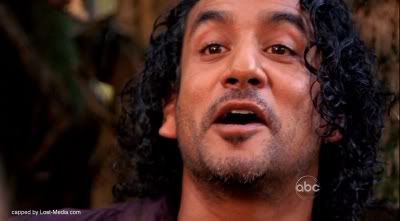
Sayid ended up tied to a tree just like Sawyer, bound by his own self loathing, obstinately refusing to cooperate in his own rescue. And like Sawyer, who finally confessed that he didn't have the inhalers, Sayid ended up telling the truth, the whole truth and nothing but the truth.
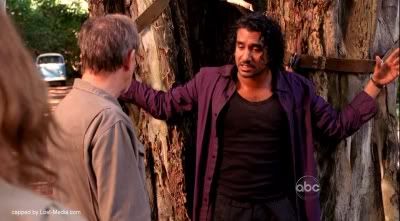
Of course no one believed him. In the Land of Lies, Truth looks like an imposter. The Dharma had no way of knowing the truth that they had already been infiltrated by a whole host of spies, emissaries from the future who were going to do their level best to completely smash their little utopian eggshell. Sayid from the future, knowing exactly who Ben from the Past will grow up to be, shoots a hole in the fabric of time. Or at least into the fabric of Ben's sweatshirt. What ripples will echo into time because of this one rock being thrown through the looking glass?
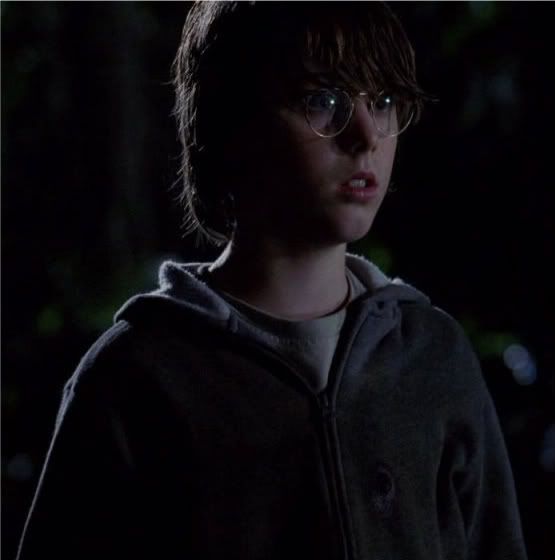
If the story follows true to the Lawz laid down in episode one of season five, then Whatever Happened, Happened. Logically that means Ben is not dead. Simply put, it's impossible. We already saw that he grew up and became the man who sent Sayid on his murder spree. The murder spree that caused Sayid's soul to curdle. The curdled soul that caused Sayid to shoot the little boy who only wanted to be his friend. The betrayal that caused the little boy to grow into the man who sent Sayid on his murder spree.
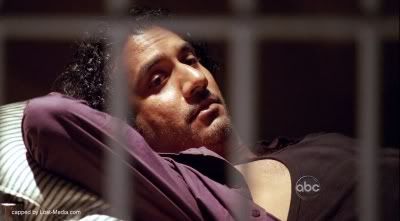
"The only difference between a human being and a stone rolling down a hill is that the human being thinks he is in control of his own destiny." - Spinoza
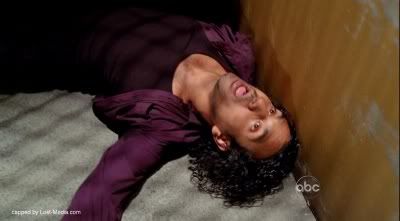
It's not fair to blame Sayid entirely for Ben's nature, of course, any more than Ben can be made responsible for Sayid's choice to kill. After all, Ben sent the burning bus sailing into a houseful of people before Sayid had the chance to betray him. Even if Sayid had chosen the alternate course, and tried to be a benevolent Big Brother to the little deviant, odds are Ben wouldn't have grown up straight and good. In the Nature vs. Nurture showdown, it's not clear which of these men was born a killer. A case could be made that both had gentle souls that were gradually murdered by the thousand tragic cuts of their sad, blighted lives. Perhaps we are being asked to only understand them both and judge neither. Sayid wore purple throughout this episode, the color of repentance, the liturgical color of Lent. He was sincerely seeking redemption when he chose to murder Ben. He was embracing the ethos of Faith. He had found his purpose. In his own way, he thought he was choosing to save the world. It's not his fault that, in this story, the concept of individual choice is nothing but a big unfunny joke.
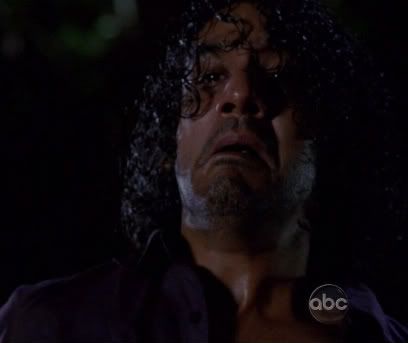
"We have to believe in free will. We have no choice." - Isaac Bashevis Singer
This is a concept we Lost fans should all be familiar with. We know next week we have to watch more fun and games on the Dharma Kibbutz. We know that whatever happened will happen again. We know they won't tell us what actually happened until it happens a couple of dozen times. And then we'll get to see that it happened only because it always happened! And yet we'll be chomping at the bit to see it happen. You see? It's true. There is no such thing as free will. We are in fact all fools enslaved by time and space.
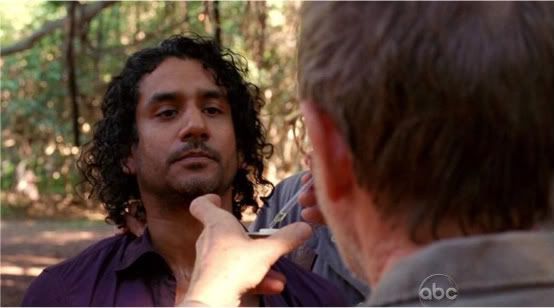
It's time we all just accepted it. Read more...
Subscribe to:
Posts (Atom)